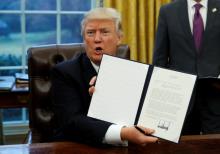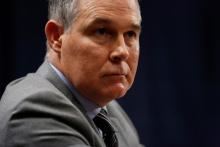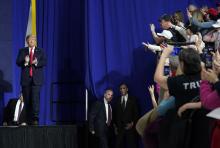trump

The historic meeting was set for June 12 in Singapore, but was cancelled by Trump this month. The U.S. approach to this meeting was concerning. Trump felt that the U.S. did not have to do anything to prepare for the June meeting. He continues to keep a military presence in South Korea with joint U.S. and South Korean military exercises that have always been a threat and irritation to North Korea. The mere presence of 25,000 U.S. Troops in South Korea heightens the suspicions and anxieties of Kim Jong un and the North Korean people. Trump has become blind to the need for diplomacy.

Calling people “animals” misses the mark on all of this, even if the comment only referred to gang members. No, we shouldn’t shrug at evil or avoid calling out awful things and people who are causing great suffering — an important part of our power with language. But even in naming evil we’re to be guided by love for the suffering and those who cause suffering. Jesus loved the criminal on the cross next to him on Golgotha. Each person is made in God’s image and loved by God.

President Donald Trump promised Friday at a prison reform summit at the White House that a bill to reform the U.S. incarceration system is “going to be strong, it’s going to be good, it’s going to be what everyone wants.” Members of Congress from both sides of the aisle, though, said the bill does not do enough to address prison reform, making the passing of a bill less and less likely before the midterm elections.

The most theologically significant prayer at the ceremony, however, was offered by John Hagee, a megachurch pastor from San Antonio. Hagee, a longtime supporter of Israeli policies, thanked the Lord on this occasion “that Jerusalem is and always shall be the eternal capital of the Jewish people.”

U.S. President Donald Trump announced last December plans to relocate the U.S. embassy from Tel Aviv to Jerusalem, in a move to recognize Jersualem as the capital of Israel, upending decades of U.S. policy and outraging Palestinians.

Evangelicals recognize their dilemma. If they encourage the president to change, he’ll kick them to the curb. They’ve seen his ugly responses whenever anyone challenges him or suggests he is less than perfect.

In much of the last century, American Evangelicalism has had a complex relationship with power. On one hand, it has felt itself marginalized and repudiated, defeated, and silenced. On the other, it has often seemed to seek — even fawn over — worldly power, mimicking in the church forms of power evident in our culture. (I remember being at a conference where it was announced we should all be back after dinner for “an evening of star-studded worship.”) An evangelical dance with political power has been going on from the time of Billy Graham, through the Moral Majority and the religious right, to the Tea Party, and most recently with the white evangelical vote—the result being, as honorary Chairman of the Lausanne Movement Doug Birdsall has said, “When you Google ‘evangelical,’ you get Trump.”

I HAIL FROM a theological tradition that places the highest value on epistemology, the study of how we think about God, yet tends to invest little energy on ethics, the study of how we are called to interact in the world.
Likewise, many in my theological tradition place ultimate value on one’s capacity for faith in particular sets of beliefs—and tend to demonstrate hostility toward historical, anthropological, philosophical, and scientific methods to shape those beliefs, unless those methods happen to support the tradition’s faith-born premises. Think: climate-change denial. This article of faith is partially rooted in profound belief in a particular reading of Genesis 1:26 and human dominion. It is not rooted in science.
Perhaps this reveals one reason why so much of the white evangelical community saw no red flags when Donald Trump refused to show his tax returns. They believed in him. They did not need to see evidence.
Perhaps this is the reason it does not faze many white evangelicals that Trump trafficked in fake news, conspiracy theory, and innuendo to win the presidency and continues the practices in the aftermath. Trump’s relationship to fact may mirror their own. It almost seems as if life in this world and the hard facts that govern life have nothing to do with anything. I’m thinking of the fold-over tracts or Facebook posts that fly through evangelical circles during every presidential election cycle. They claim the Democratic candidate is the Antichrist and warn of the horrors if she or he is elected. It doesn’t matter if the Democrat or the Republican promises to protect the poor. All that matters is which one assures the voter’s stature in the afterlife. And who wants to go to hell because they voted for the Antichrist? Not me.

OKAY. SORRY. It only feels like it’s been a year, an exhausting 12 months of angry tweets, corrosive diplomacy, and cowering federal workers. And that was just in December! You remember, don’t you? That time before the inauguration when we were supposed to have only one president at a time, and it wasn’t Obama?
That was when Donald Trump announced his cabinet nominees, mostly billionaire business people suspected of being woefully unqualified for government service. Then they spoke at their congressional hearings and removed all doubt.
Sadly, we still have nine months to go before we can steel ourselves for Donald Trump’s second and final year as president, when many political experts predict that financial entanglements will make his impeachment inevitable. It will be an ugly televised spectacle, probably dragging on into sweeps week, but let’s be honest: Trump would want it that way. And he’ll take pride that his impeachment hearings will get bigger audiences than even his inauguration, where millions of his imaginary friends showed up, although they were too shy to be photographed.
And then he’ll be fired. A welcome possibility until you remember who’s next in line, an Old Testament Christian whose perfect hair and smooth monotone evoke a preening televangelist right before his inevitable downfall. And if he falls, we get Paul Ryan, a man who would privatize his own mother. (Okay, that doesn’t make sense. Sorry. Sometimes the writing gets away from me.)

Father Benjamin E. Alforque is convener of the church-based Filipino group Rise Up for Life and for Rights. Alforque was interviewed via email in February by Eric Stoner.
Eric Stoner: Was there a tipping point that set Rise Up in motion?
Benjamin Alforque: The tipping point was when the killing of the poor started to include poor farmers and peasants who were leaders of the justice and peace groups and organizations, but who were [falsely] charged with being drug users or pushers.
Are people’s opinions of the drug war and extrajudicial killings changing? Many people thought it was okay to kill drug addicts and pushers. People felt safe that they could leave their homes at night to do their jobs without fear that a drug addict would barge into their huts and small homes, rape women, and kill families just to get money for drugs. They favored immediate execution because, after all, we have no rehabilitation facilities, the jails and prisons are full, and government has no money to spend for their incarceration and rehabilitation. But now, with the extent of the killing of the poor, many are fearful. They fear that they could be the next victim, because the police have a quota of drug-related deaths, and they could be the next one to fill the quota.
Do you see the Catholic Church taking a more active position? On Feb. 18, the church mobilized some 10,000 people to Walk for Life. Bishops have come into the open, telling the president that death is not the answer to the proliferation of drugs and addiction. This show of force by the Catholic Church against extrajudicial killings related to drugs [is also against] the move in Congress, with executive approval, to revive the death penalty.
The church could do more. It can open its facilities and resources for the positive care of drug addicts. In its pastoral program, dioceses, parishes, and church-based institutions could strengthen catechetical approaches and family life ministries to address the real social roots of addiction and other related maladies.
But more important, the church should walk with the poor in their struggle for substantial radical social transformation. She must fully give witness to the Vatican II documents, especially becoming more fully the church of the poor through basic ecclesial communities as agents of transformation. She must strengthen her pastoral program with the poor and not make her identity revolve around the sacraments and the liturgy that are emptied of their original social content for liberation-salvation. If the church lives more fully with the poor, then she can protect the poor while at the same time being a target with them. That is her cross and her martyrdom. There also lies her genuine participation in the resurrection of Jesus.
Where do you find hope? In my sermons I say, “You must rise up together and assert and protect the gains of the resurrection of Jesus, the gains that he has in store for all of us who believe in him!” The mass movement of the poor is where I find hope. They incarnate the passion-death-resurrection of Jesus. They relive the pristine experience of early Christianity in various ways for the event of God’s reign.

FOR MANY OF US, how people treat the Earth goes far deeper than “politics.” Our relationship with God’s creation is, at heart, a theological matter.
The Paris climate accord is not perfect—it does not go far enough and it is not binding. Nevertheless, it was a giant step forward to have 195 countries commit to curbing the carbon emissions that are endangering the planet and the people who live on it, especially the poorest and most vulnerable. That step was very important, the result of decades of hard work and diligent diplomacy.
Therefore, Donald Trump’s decision to withdraw the United States from the agreement is a theological failure and an abdication of American leadership on perhaps the most important crisis facing the world today. Politically, it was enormously shallow, arrogant, and truth-less: three words that sadly characterize many of the bombastic statements and decisions the administration has made.

“DACA’s rescission was arbitrary and capricious because the Department failed adequately to explain its conclusion that the program was unlawful,” Bates wrote in his opinion statement released Tuesday. “Neither the meager legal reasoning nor the assessment of litigation risk provided by DHS to support its rescission decision is sufficient to sustain termination of the DACA program.”

While we humans strive to make the world a better place, and while we must, in Jesus’s words, look first for the mote in our own eye, we will not always succeed. We cannot always escape the worst parts of ourselves.

"Work requirements do not create jobs; they instead create barriers to assistance for those who need them, oftentimes when their situation is most dire," House Democratic Whip Steny Hoyer (M.D.) and Rep. Barbara Lee (D-C.A.) said in a joint statement. "This executive order perpetuates false and racist stereotypes about certain groups supposedly taking advantage of government assistance."

That the morally bankrupt Trump would overlook the ethical improprieties of Pruitt is a surprise to no one. But what’s the excuse for evangelicals? How do #NeverTrump evangelical voices have nothing to say about the glaring ethical breaches of their pal, Scott Pruitt?

More than 500 people, including many children, were bought to medical centers showing signs of chemical attacks. Footage shows images of dead bodies with foam visible on their noses and mouths — a clear sign of a chemical attack.

At the time, authors like conservative political activists Tim and Beverly LaHaye and Focus on the Family founder James Dobson acknowledged that porn was a problem that Christians (almost always men but on occasion women) faced. Their writing focused on how pornography harmed marital relationships and personal well-being. At the same time, however, it described how devout Christians may be pornography consumers.

“Evangelical” is a word that now needs to be defined carefully, given how much it has been distorted and corrupted by both the media and the behavior of white evangelicals. The good news of the gospel of Jesus Christ is now at stake — as is the integrity of Christian faith for at least a generation to come.

But back to the wall idea, which President Trump said could easily be built by the Army Corps of Engineers, because they’re, you know, in the army right? He assured skeptical Pentagon officials that the $20 billion would be more like a loan, because, duh, Mexico would pay it back. In fact, U.S. negotiators are already working with their Mexican counterparts to establish the precise terms of repayment. Asked if he prefers reimbursing the American treasury with a lump sum or in monthly payments, Mexican president Enrique Peña Nieto replied, pleasantly, “How about nada? Does nada work for you?”

Our concerns about the future of our nation’s values, heart, and soul, and even for democracy itself compel us to respond more theologically than politically, where what we believe is the foundation of the things we must vocally reject. We believe that the future of the nation’s soul, and the integrity of faith, are both at stake.